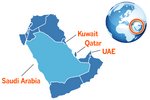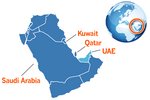I am always surprised when people ask whether you are safe
in Saudi Arabia. Saudis do not have the right to bear arms,
the penalty for murder is public beheading, and the society
is generally not as influenced by the violent entertainment
which is prevalent in the Western world. So when I point out
that, apart from being in a region of the world where there
are currently two wars being fought (maybe more, depending
on what you consider a "war"), most of the women and men we
have recruited report that, on a day-to-day basis, they
personally feel much safer in Saudi Arabia than they do in
Toronto, or Atlanta, or any other North American city. They
feel they will not be shot on the street, have a child
grabbed, their home broken into, their purse snatched, etc.
Although Saudi Arabia has other social practices alien to
Westerners, random violence against strangers on the streets
is a real rarity.
Contrary to common belief, you don't earn zillions of
dollars in Saudi Arabia. This doesn't stop people from
trying: One man, a laborer, asked for a job at $1,000/day. A
department manager (who earns $140,000) asked for $465,000
per year (plus a house with several more bedrooms than he
has family members, a maid, etc.). Another person, a doctor,
asked for housing with "a baby grand piano, not an upright."
The reality is that, with a few exceptions, the salaries for
middle-management and staff-level positions (non-MD) are
approximately the same as one would earn in the USA or
Canada. But they are significantly higher than are salaries of non-MD health care staff in the UK and Western Europe. The major financial benefits are the tax-free
status, paid housing, and significantly more holiday time.
The major non-financial benefit is having a life-enhancing
experience.
Americans regularly ask whether Arabs, Saudis, or Muslims
"hate Americans." Yes, Arabs and Muslims in general are
hostile to the foreign policy of the United States as it
relates to the Middle East, particularly America's official,
unquestioned support of Israel's actions towards the
Palestinians and their uncaring attitude towards the plight
of the Palestinians. But on an individual basis, the Saudis
admire the can-do attitude, the openness, and the
professional expertise for which Americans are known. Many
Saudis do post-graduate training in healthcare, in business,
and in management in the United States. Person to person,
Saudis welcome Americans. (And yes, you must drink at least
one glass of the special cardamom coffee when it is offered,
which, I confess to is not to my liking — I prefer the glass of
syrupy sweet mint tea.)
Another common question, particularly from women, is "Am I
restricted to my housing compound?" Absolutely not. You can
travel freely throughout Riyadh, Jeddah, and the other
cities. Really, mosques are the only public place women and
non-Muslims are forbidden from entering — but
occasionally one may be invited in to see the mosque outside
of prayer time, as three of my staff were several years ago.
Also, men are not allowed to enter women-only shopping
areas, bank branches, etc. And in Jeddah, there is a beach
that is restricted for the use of people from Western
countries. And yes, Western women can travel alone - they don't have
to be in the company of a male relative.
People are often are under the mistaken belief that Saudi
Arabia is backward technologically. However, Saudis love
their electronic gadgets; they are avid watchers of
satellite TV; they were early adopters of the internet; and
it's not uncommon to see people, like gunslingers of the old
west, whip out two cell phones when a phone starts ringing.
But perhaps the greatest misconception is that women are
oppressed. In Saudi Arabia, education is strongly encouraged,
and currently, as in many Western countries, women make up a
greater percentage of university graduates. In many ways,
attitudes are only a few decades behind those of Western
countries, where up until the 60s, women were expected to
marry right out of high school, have families rather than
careers, dress modestly, etc. It sounds like the current
situation of many Saudi women, doesn't it? So while it's
true that many women in Saudi do stay home after having
children, it's also true that many Western women would love
to, but, financially, couldn't possibly. (As one Canadian
nurse who worked in the Kingdom says, a Saudi woman told her
that she felt sorry for her!) And women can now drive, and are no longer
mandated to wear an abaya.
Helen Ziegler







